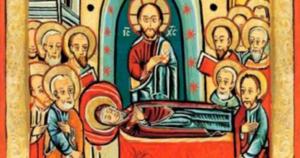 Philosophy, the love of wisdom, begins in knowing self. This is not the “self-knowledge” of the self-centered person who implodes while gazing inside his own head. Instead, wisdom begins when we see God, nature, and who we are as people and as individuals in the Divine order.
Philosophy, the love of wisdom, begins in knowing self. This is not the “self-knowledge” of the self-centered person who implodes while gazing inside his own head. Instead, wisdom begins when we see God, nature, and who we are as people and as individuals in the Divine order.
So Socrates thought, Plato taught, and God revealed in the person of Jesus Christ.
Socrates’ insight began with a phrase tied to the Oracle of Delphi: know your self. In context there, the supplicant was reminded that before Apollo, the god of the Oracle, he was not such a much. A man must know his place before the gods.
Against the gods, as described by the poets, Socrates was merciless. The gods, if they existed as Homer and others had described them, were a bad lot. They were not worthy of worship. Instead, Socrates looked to a totally other sort of being, a Craftsman or God, who was creator following the pattern of the good, truth, and beauty. The gods might or might not exist, arguments for them (as compared with those for God) were lacking, but perhaps they were real. The just-so stories told about them were not.
This was obvious enough that thoughtful Greeks before Socrates almost surely did not believe their own “stories.” They had rehabilitated them by retelling them to produce a more plausible or at least probable account. Did the wind god carry away a girl on this river bank? Mayhap the wind pushed her over the bank and so the story grew?
Socrates saw limited value in this effort:
Now I quite acknowledge that these allegories are very nice, but he is not to be envied who has to invent them; much labour and ingenuity will be required of him; and when he has once begun, he must go on and rehabilitate Hippocentaurs and chimeras dire. Gorgons and winged steeds flow in apace, and numberless other inconceivable and portentous natures. And if he is sceptical about them, and would fain reduce them one after another to the rules of probability, this sort of crude philosophy will take up a great deal of time.*
Just so.
Over this long life Plato would use the images of Homeric theology this way at times (see the image of the soul in Republic IX). For the most part, he was less interested in the gods, who were just super-humanoids, than in mind and God. The nature of our own soul (or consciousness/mind) was more important than some other humanoids, who did not seem very nice in any case. The cosmos, the ordered paradigm of nature, was helpful in seeing our own souls, the spark of divinity within us, but so was God.
If God existed, and Plato knew God did**, then that great Mind, of which are a moving pattern, was even more useful. The original, the greater, could explain the copy, the lesser.
Now I have no leisure for such enquiries; shall I tell you why? I must first know myself, as the Delphian inscription says; to be curious about that which is not my concern, while I am still in ignorance of my own self, would be ridiculous. And therefore I bid farewell to all this; the common opinion is enough for me. For, as I was saying, I want to know not about this, but about myself: am I a monster more complicated and swollen with passion than the serpent Typho, or a creature of a gentler and simpler sort, to whom Nature has given a diviner and lowlier destiny?*
Socrates, coming before the Logos becoming flesh, could not be sure if his nature was monstrous or divine (though lesser than God). As the stories about the gods and men showed, we are not what we should be. There is a gap between our perceptions about what is in the world and what ought to be. This gap must be explained. Do we the natures of the great servant or of God?
We are small in the cosmos, but reason. What are we? Humans are not gods, mortal and doomed to die. We are not God: that is an eternal being of which there could only be one. Instead, we are not what we ought to be with eternity in our hearts. Socrates turned toward the human soul and the quest for the Divine.
On the other side of Christmas, when the Word came and showed us the Way to God, may we do the same, but this time with the power of the Holy Spirit.
Maranatha!
——————————————-
*Plato, Phaedrus. 229D (Nichols translation)
**See late dialogues like Timaeus and Laws.











